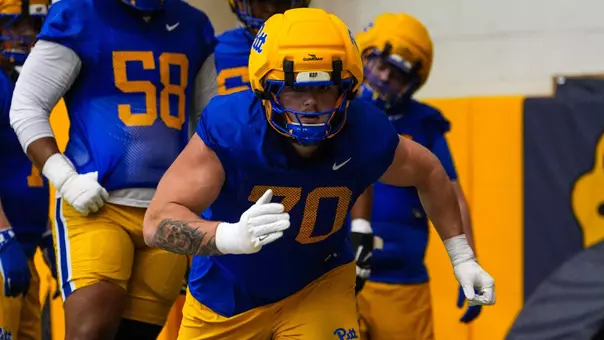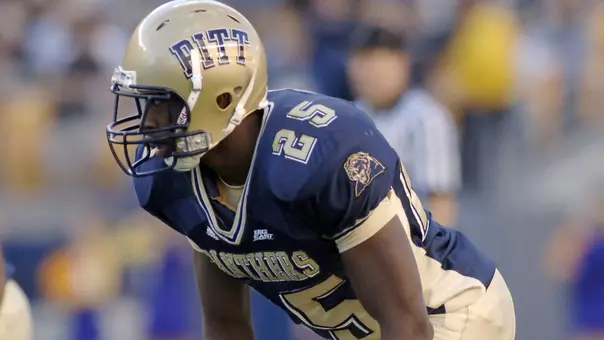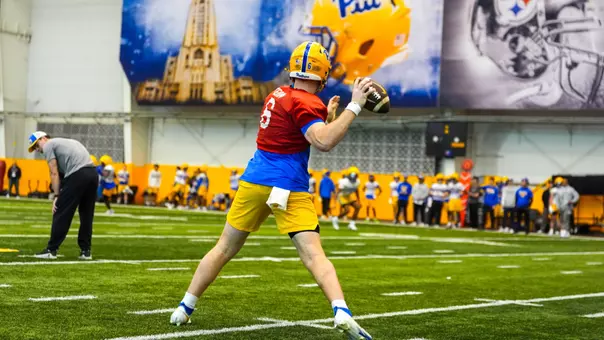University of Pittsburgh Athletics
College Football Hall of Fame Candidate: Matt Cavanaugh
6/3/2019 11:00:00 AM | Football
Matt Cavanaugh's four-year career at Pitt can be summed up in the simplest of terms—he was a winner.
Named to the College Football Hall of Fame ballot for the 2020 induction class, Cavanaugh played quarterback for two different head coaches while at Pitt—Johnny Majors the first three seasons (1974-76) and Jackie Sherrill in 1977. As a collegian, he won 78% of his games as a starter, was a two-time bowl MVP and earned first-team All-America honors. He would then go on to a 14-year career in the National Football League.
Even with all of his individual accolades, Cavanaugh will always be most fondly remembered in Panther lore for quarterbacking Pitt to the 1976 national championship. He capped that legendary campaign with an MVP performance against Georgia in the Sugar Bowl, a 27-3 win that clinched a 12-0 season.

Facing Georgia's heralded "Junkyard Dogs" defense, Cavanaugh's play spurred Pitt to a commanding 21-0 lead at halftime. He scored the first touchdown of the game on a six-yard keeper and the celebration of that score became a Sports Illustrated cover (Jan. 10, 1977).
In addition to his rushing touchdown, Cavanaugh dominated the opening two quarters by throwing for 185 yards (on 7-of-11 passing), including a beautiful 59-yard TD connection to Gordon Jones on a slant pattern.
Although Pitt tailback Tony Dorsett would finish with a Sugar Bowl-record 202 yards, the attending media selected Cavanaugh the MVP for delivering the "knockout punch" by halftime.
The win completed a Cinderella story for the Panthers and Majors, who would depart to take over as head coach of his alma mater, Tennessee. But Cavanaugh still had more chapters to write in his Pitt career.
The Panthers had realistic hopes to repeat as national champions in 1977. In a highly anticipated opener with preseason No. 1 Notre Dame, those aspirations were alive and well when Pitt seized a 9-0 lead in the first quarter, the touchdown coming on a 12-yard touchdown pass by Cavanaugh.
That scoring toss, however, would be Cavanaugh's final action of the day. In delivering the pass, his (non-throwing) wrist was broken by an onrushing Willie Fry. Without Cavanaugh, the Pitt offense crumbled, losing five fumbles and ultimately the game, 19-9.
"With Cavanaugh in there I feel we're a very good team, even a great team," Sherrill said. "Without Matt we become a very ordinary one."
The wrist sidelined Cavanaugh for the next three games. But his return would help the Panthers finish the season in a flurry, including an astounding effort in the 1977 Gator Bowl.
In one of the finest performances by a quarterback in Pitt history, Cavanaugh directed a complete demolition of the highly regarded Clemson Tigers, 34-3. He completed 23-of-36 passes for 387 yards and four touchdowns as the Panthers outgained Clemson, 566 to 268.
Cavanaugh was the easy choice for Gator Bowl MVP—364 days after he earned the same award at the Sugar Bowl in New Orleans.
The Clemson win capped a 9-2-1 season for Pitt, which ranked as high as No. 7 in the final polls.
"Matt Cavanaugh is the finest quarterback in the country," said Sherrill. "I shudder to think what we could have done had he stayed healthy."
Cavanaugh went on to spend 14 years as a quarterback in the NFL. A second-round selection of New England in 1978, he spent five seasons (1978-82) with the Patriots before moving on to stints with the San Francisco 49ers (1983-85), Philadelphia Eagles (1986-89) and New York Giants (1990-91).
In addition to his collegiate championship, Cavanaugh earned three Super Bowl rings, including two as a player (with the 49ers in 1984 and the Giants in 1990) and one as a coach (Baltimore Ravens in 2000).
Cavanaugh was an assistant coach and coordinator in the NFL for more than a decade before returning to Pitt as offensive coordinator and quarterbacks coach in 2005. He is now a senior offensive assistant with the Washington Redskins.
About The National Football Foundation (NFF) & College Hall of Fame 2020 Ballot:
The 2020 ballot includes 76 players and five coaches from the NCAA Football Bowl Subdivision and 101 players and 33 coaches from the NCAA divisional and NAIA ranks. To be eligible for the ballot, players must have been named a First Team All-American by a major/national selector as recognized and utilized by the NCAA for their consensus All-America teams; played their last year of intercollegiate football at least 10 full seasons prior; played within the last 50 years; and cannot be currently playing professional football. Coaches must have coached a minimum of 10 years and 100 games as a head football coach; won at least 60 percent of their games; and be retired from coaching for at least three full seasons. If a coach is retired and over the age of 70, there is no waiting period. If he is over the age of 75, he is eligible as an active coach. In all cases, the candidate's post-football record as a citizen may also be weighed.
The ballot will be emailed the week of June 2 to the more than 12,000 NFF members and current Hall of Famers whose votes will be tabulated and submitted to the NFF's Honors Courts, which deliberate and select the class. The FBS Honors Court, chaired by NFF Board Member and College Football Hall of Famer Archie Griffin from Ohio State, and the Divisional Honors Court, chaired by former Marshall head coach, longtime athletics director and NFF Board Member Jack Lengyel, include an elite and geographically diverse pool of athletic administrators, Hall of Famers and members of the media.
As part of a continuing tradition, the NFF has partnered with the College Football Playoff (CFP) to announce the new College Football Hall of Fame class during festivities prior to the National Championship in the host city. The announcement of the 2020 Class will be made in January 2020 in New Orleans, and they will be inducted during the 63rd NFF Annual Awards Dinner on Dec. 8, 2020, at the New York Hilton Midtown. The inductees will be permanently enshrined at the Chick-fil-A College Football Hall of Fame in Atlanta.
Of the 5.33 million individuals who have played college football since Princeton first battled Rutgers on Nov. 6, 1869, only 1,010 players have earned induction into the College Football Hall of Fame, or less than two one-hundredths of a percent (.02%) of those who have played the game during the past 150 years. From the coaching ranks, 219 individuals have achieved Hall of Fame distinction.
#H2P | Facebook | Twitter | Instagram
Named to the College Football Hall of Fame ballot for the 2020 induction class, Cavanaugh played quarterback for two different head coaches while at Pitt—Johnny Majors the first three seasons (1974-76) and Jackie Sherrill in 1977. As a collegian, he won 78% of his games as a starter, was a two-time bowl MVP and earned first-team All-America honors. He would then go on to a 14-year career in the National Football League.
Even with all of his individual accolades, Cavanaugh will always be most fondly remembered in Panther lore for quarterbacking Pitt to the 1976 national championship. He capped that legendary campaign with an MVP performance against Georgia in the Sugar Bowl, a 27-3 win that clinched a 12-0 season.

Facing Georgia's heralded "Junkyard Dogs" defense, Cavanaugh's play spurred Pitt to a commanding 21-0 lead at halftime. He scored the first touchdown of the game on a six-yard keeper and the celebration of that score became a Sports Illustrated cover (Jan. 10, 1977).
In addition to his rushing touchdown, Cavanaugh dominated the opening two quarters by throwing for 185 yards (on 7-of-11 passing), including a beautiful 59-yard TD connection to Gordon Jones on a slant pattern.
Although Pitt tailback Tony Dorsett would finish with a Sugar Bowl-record 202 yards, the attending media selected Cavanaugh the MVP for delivering the "knockout punch" by halftime.
The win completed a Cinderella story for the Panthers and Majors, who would depart to take over as head coach of his alma mater, Tennessee. But Cavanaugh still had more chapters to write in his Pitt career.
The Panthers had realistic hopes to repeat as national champions in 1977. In a highly anticipated opener with preseason No. 1 Notre Dame, those aspirations were alive and well when Pitt seized a 9-0 lead in the first quarter, the touchdown coming on a 12-yard touchdown pass by Cavanaugh.
That scoring toss, however, would be Cavanaugh's final action of the day. In delivering the pass, his (non-throwing) wrist was broken by an onrushing Willie Fry. Without Cavanaugh, the Pitt offense crumbled, losing five fumbles and ultimately the game, 19-9.
"With Cavanaugh in there I feel we're a very good team, even a great team," Sherrill said. "Without Matt we become a very ordinary one."
The wrist sidelined Cavanaugh for the next three games. But his return would help the Panthers finish the season in a flurry, including an astounding effort in the 1977 Gator Bowl.
In one of the finest performances by a quarterback in Pitt history, Cavanaugh directed a complete demolition of the highly regarded Clemson Tigers, 34-3. He completed 23-of-36 passes for 387 yards and four touchdowns as the Panthers outgained Clemson, 566 to 268.
Cavanaugh was the easy choice for Gator Bowl MVP—364 days after he earned the same award at the Sugar Bowl in New Orleans.
The Clemson win capped a 9-2-1 season for Pitt, which ranked as high as No. 7 in the final polls.
"Matt Cavanaugh is the finest quarterback in the country," said Sherrill. "I shudder to think what we could have done had he stayed healthy."
Cavanaugh went on to spend 14 years as a quarterback in the NFL. A second-round selection of New England in 1978, he spent five seasons (1978-82) with the Patriots before moving on to stints with the San Francisco 49ers (1983-85), Philadelphia Eagles (1986-89) and New York Giants (1990-91).
In addition to his collegiate championship, Cavanaugh earned three Super Bowl rings, including two as a player (with the 49ers in 1984 and the Giants in 1990) and one as a coach (Baltimore Ravens in 2000).
Cavanaugh was an assistant coach and coordinator in the NFL for more than a decade before returning to Pitt as offensive coordinator and quarterbacks coach in 2005. He is now a senior offensive assistant with the Washington Redskins.
About The National Football Foundation (NFF) & College Hall of Fame 2020 Ballot:
The 2020 ballot includes 76 players and five coaches from the NCAA Football Bowl Subdivision and 101 players and 33 coaches from the NCAA divisional and NAIA ranks. To be eligible for the ballot, players must have been named a First Team All-American by a major/national selector as recognized and utilized by the NCAA for their consensus All-America teams; played their last year of intercollegiate football at least 10 full seasons prior; played within the last 50 years; and cannot be currently playing professional football. Coaches must have coached a minimum of 10 years and 100 games as a head football coach; won at least 60 percent of their games; and be retired from coaching for at least three full seasons. If a coach is retired and over the age of 70, there is no waiting period. If he is over the age of 75, he is eligible as an active coach. In all cases, the candidate's post-football record as a citizen may also be weighed.
The ballot will be emailed the week of June 2 to the more than 12,000 NFF members and current Hall of Famers whose votes will be tabulated and submitted to the NFF's Honors Courts, which deliberate and select the class. The FBS Honors Court, chaired by NFF Board Member and College Football Hall of Famer Archie Griffin from Ohio State, and the Divisional Honors Court, chaired by former Marshall head coach, longtime athletics director and NFF Board Member Jack Lengyel, include an elite and geographically diverse pool of athletic administrators, Hall of Famers and members of the media.
As part of a continuing tradition, the NFF has partnered with the College Football Playoff (CFP) to announce the new College Football Hall of Fame class during festivities prior to the National Championship in the host city. The announcement of the 2020 Class will be made in January 2020 in New Orleans, and they will be inducted during the 63rd NFF Annual Awards Dinner on Dec. 8, 2020, at the New York Hilton Midtown. The inductees will be permanently enshrined at the Chick-fil-A College Football Hall of Fame in Atlanta.
Of the 5.33 million individuals who have played college football since Princeton first battled Rutgers on Nov. 6, 1869, only 1,010 players have earned induction into the College Football Hall of Fame, or less than two one-hundredths of a percent (.02%) of those who have played the game during the past 150 years. From the coaching ranks, 219 individuals have achieved Hall of Fame distinction.
#H2P | Facebook | Twitter | Instagram
Pitt Football | Meet the new guys: LB edition
Thursday, March 05
Pitt Football | Coach Narduzzi was on the phones in the Pitt Ticket Office!
Wednesday, March 04
Media Availability | Spring Practice #2
Wednesday, March 04
Pitt Football | Spring Practice Day ONE in the books!
Tuesday, March 03



